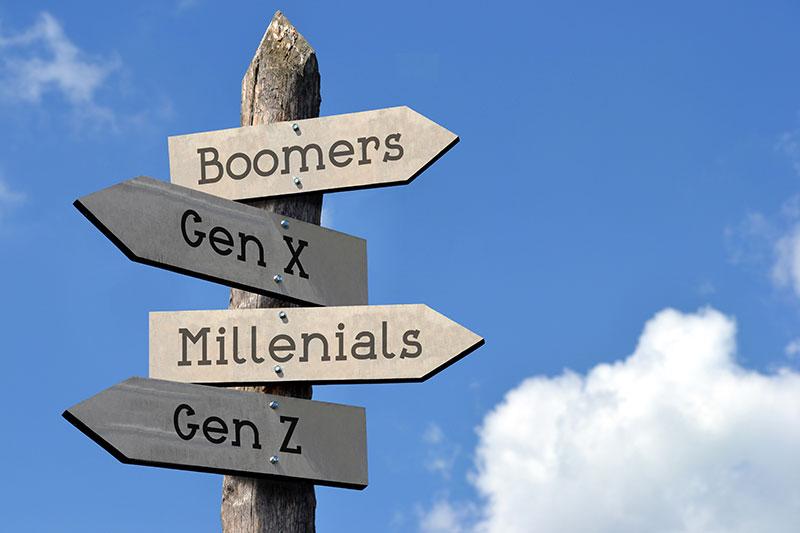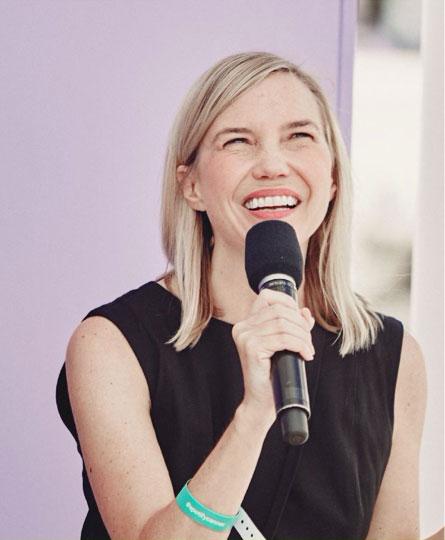Dishing tea on Generation Z

Melissa Lavigne-Delville (MBA ’25) may be Generation X, but she knows more about TikTok and the latest memes than most 17-year-olds.
Lavigne-Delville is the founder of Culture Co-op, a boutique market research company that specializes in youth culture analysis and trend forecasting. Founded in 2012, the company produces culture forecasts, research documentaries and trend talks that explore the values, beliefs, tastes and attitudes of today’s generations. The company’s clients include an A-list of leading brands, including Netflix, Disney, Meta, Spotify and BuzzFeed.
Culture Co-op’s research methods blend qualitative and quantitative approaches, including interviews, focus groups, ethnographies and comprehensive surveys. By leveraging both personal conversations and statistics-based research, Lavigne-Delville offers clients a snapshot of today’s youth as well as forecasts of where their tastes and interests are expected to go.
“We think of forecasting trends for our clients as similar to telling a research-based story,” says Lavigne-Delville. “Stories capture where people are and where they’re headed based on insights, and a big piece of what we do is try to breathe life into the data and create narratives that inspire our clients.”

Lavigne-Delville’s story began in Philadelphia, where she grew up before heading to Vanderbilt University for college. Her love for the South was cemented during her college years, with frequent visits to New Orleans for Mardi Gras and Jazz Fest. After graduating with a degree in Communication Studies, she returned to Philadelphia and got a job as a buyer for Urban Outfitters when the company was still in its nascent stages.
In 2001, she moved to New York City. After paying her requisite dues, she ultimately took a job with Creative Artists Agency and spent the next seven years working for the firm and raising her three children. At the time, CAA had just purchased Youth Intelligence, a market research group focused on young people, and that’s where Lavigne-Delville developed her skills in generational and trends research. That experience led to a job with NBCUniversal, where she launched a trend and generational research unit within the company.
Following a move to the Bay Area in 2012, Lavigne-Delville sought the flexibility of working for herself, so she took the knowledge she’d developed in New York and established her own independent agency. NBCUniversal and its sister company, Comcast Ventures, became her first two clients.
“I think what differentiates Culture Co-op is our emphasis on getting on the ground,” she says. “As things have become more digital, there’s so much you can do from the comfort of your computer, but there’s nothing quite like going into the field and talking to people where they are and where they’re from, so that’s something we’ve made a part of our culture.”
While Culture Co-op conducts research on families and older demographics, Lavigne-Delville says its sweet spot is the 13-to-34 age group, the demographic most highly sought by advertisers.
“A lot of the companies we work with tend to be media and tech companies, and a lot of them are doing thought leadership research as a service to their advertisers,” she says. “For example, Netflix just started its advertising business, so they want to be able to tell advertisers, ‘We know young people really well, we know how they’re changing as people and as audiences, and we’re able to develop the content that really resonates with them. Here’s this interesting study on the latest and greatest of youth culture and how they’re consuming streaming versus social media.’ And that's how they build the relationship with advertisers.”
Lavigne-Delville says about 75% of Culture Co-op’s work is with media and tech companies, but it also works with top consumer brands like Marriott, PepsiCo. and Chanel.
“Chanel is such an amazing heritage brand, and they know their customer inside out, but things always change,” she says. “They really just wanted to make sure they understood Generation Z because the only growth in the luxury market recently has been among young consumers like Gen Z.”
Lavigne-Delville had always wanted to get an MBA, but with three kids and a busy career, she found it hard to carve out the time. When she moved back to New Orleans in August 2023, she realized the time was finally right, and the Freeman Executive MBA’s small cohort and accelerated, in-person format appealed to her.
“The idea of going to class in person was really attractive to me, and I liked how personal it was,” she says. “When I met the faculty and staff, I just felt like they really cared, and with the small size of the cohort, there’s a lot of interaction with the instructors and that makes the experience so much more valuable.”
And what advice does Lavigne-Delville have for executives considering the EMBA program?
“Sometimes, you just have to take the leap of faith that when you’re in a very small classroom setting with really accomplished professors and really accomplished peers, you're absolutely going to get a lot out of the program,” she says. “Maybe you’ll get a raise or maybe you’ll be able to make a better deal, but just in the way the program is set up and delivered, you’re really going feel the benefits.”
Interested in advancing your education and/or career? Learn more about Freeman’s MBA programs. Find the right program for you.
Recommended Reading
- Online vs. In-Person MBA: Benefits and Differences
- How to Stay Focused and Apply for an MBA
- How to Choose an MBA Concentration
- What Will You Learn in an MBA Curriculum?
- Part-Time vs. Full-Time MBA
- What Is a Professional MBA? Overview and Career Outcomes
- What Are Dual Master’s Degree Programs?
- Can I Get a Scholarship or Fellowship for Graduate School?
Other Related Articles
- Freeman hosts Peruvian Executive MBAs
- Freeman partners with Leland to provide personalized coaching for Executive MBAs
- Alum brings rugby mindset to new consulting program
- ENFRA partners with Stewart Center to launch executive leadership program
- Restaurateur gives lessons in history and hospitality
- EMBA Marine rises through the ranks
- LEAP fellow helps NOLA entrepreneur build a better bottom line
- Freeman announces new administrative appointments
